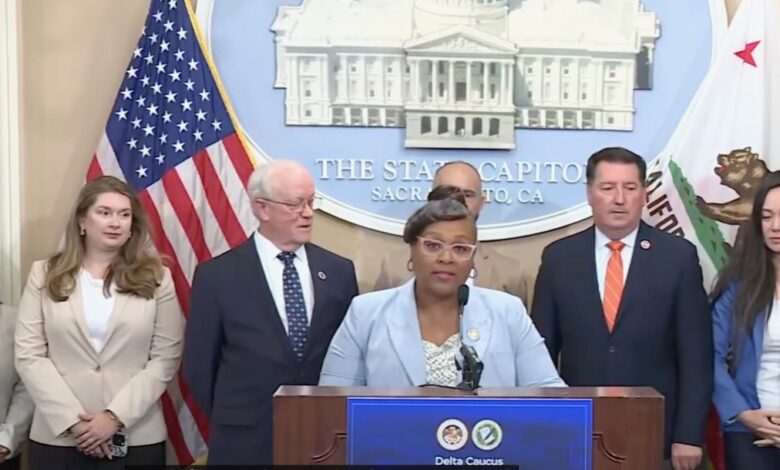
Tanu T. Henry | California Black Media
“I want to be crystal clear. Fast-tracking the Delta Conveyance Project (DCP) is a direct attack on our region’s environmental integrity, economic stability and public trust,” Assemblymember Lori Wilson (D-Suisun City) warned Gov. Newsom.
Wilson, a member of the California Legislative Black Caucus (CLBC), was speaking at a press conference on May 20 at the State Capitol organized to push back against the Governor’s plans to speed up $20 billion worth of improvements to the State Water Project (SWP), a tunnel that delivers water from Northern California to areas in the south of the state.
Wilson, who is also co-chair of the legislative Delta Caucus, was joined at the press conference by Sen. Jerry McNerney, the other co-chair of the caucus, and Assemblymember Rhodesia Ranson (D-Tracy), also a member of the CLBC.
Other Delta Caucus members — a bipartisan group of lawmakers representing counties in the Sacramento-San Joaquin River Delta, where the tunnel begins — also attended, along with officials from the Delta Coalition of Counties, regional environmental leaders and tribal leaders from the Delta.
Almost a week before, on May 14, when Gov. Newsom presented his May revision of the state’s 2025-26 budget, he announced his plans to make improvements to the water supply infrastructure he called “critical.”
Planned upgrades include a 45-mile tunnel with intakes to draw water from the Sacramento River; a connection to the California Aqueduct via the Bethany Reservoir; new earthquake-resistant features; a pumping plant, and other improvements.
“For too long, attempts to modernize our critical water infrastructure have stalled in endless red tape, burdened with unnecessary delay,” said Newsom, referring to opposition to the project by environmental leaders and others.
“We’re done with barriers — our state needs to complete this project as soon as possible, so that we can better store and manage water to prepare for a hotter, drier future. Let’s get this built,” the Governor added.
Newsom is urging the State Legislature to create policy that will simplify the process to obtain construction permits and expedite the time judicial reviews take.
Wilson said the construction on the tunnel will damage the San Joaquin Valley ecosystem.
“Shifting water from one farming region to benefit another farming region does not solve our water problem,” she said. Wilson also pointed out that the project will become a cost burden for utility ratepayers.
According to the Governor’s office, California is expected to lose 10% of its water supply and the reliability of the existing tunnel to deliver water could reduce by 23%. The project, expected to begin in 2029, is designed to respond to that eventuality by making key improvements to the tunnel that “captures, moves and stores water used by 27 million people and 750,000 acres of farmland.”
Ransom said the project would “steal water” from the Delta.
“I’m disappointed to see this proposal to override legal protections and statutes to violate both water and property rights. Let’s be real- this is a $20 billion water grab that shifts wealth from the San Joaquin Delta to wealthy Southern California interests,” said Ransom.
Both Wilson and Ransom represent districts in the Delta region that have Black populations that are among the 10 highest concentrations of African Americans in the state.
McNerney slammed the project, saying it will “destroy nearly 4,000 acres of prime farmland in the fragile Delta, along with salmon fisheries and tribal resources.”
On May 22, a number of Southern California Water utilities wrote a letter of support commending Newsom for proposing action to streamline approvals for conveyance tunnel improvements. They include The Inland Empire Utilities Agency (IEUA), Western Municipal Water District (Western Water), Eastern Municipal Water District (EMWD), and Three Valleys Municipal Water District (Three Valleys/TVMWD).
Joe Mouawad, EMWD’s General Manager, said the SWP helps to manage California’s water supply during floods and drought, but the system’s infrastructure needs urgent repair.
“There have been significant challenges and deficiencies with the current infrastructure, leading to significant water supply loss,” said Mouawad. The DCP is critical to protecting the reliability of the SWP from threats by extreme weather fluctuations, seismic activity, and aging infrastructure.”




